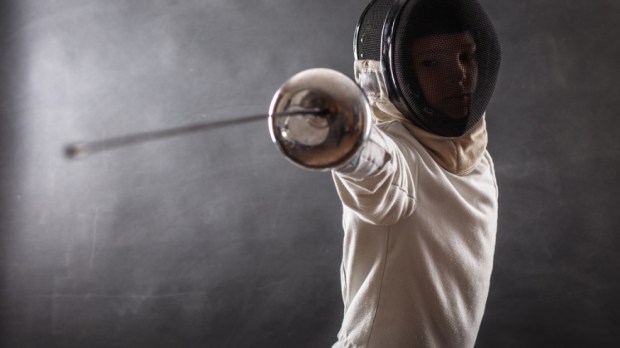Twice a week a group of 15 boys put on suits and masks and advance on a platform, announcing “en garde,” the fundamental position of a fencer. What makes this more interesting than you might think is that the boys, aged six through 16, are all placed somewhere on the autism spectrum.
Thanks to space made available by the Parish of Our Lady of Coromoto, in the Monteverde neighborhood in Rome, the “Progetto Aita” association, begun in 2001 to provide support to children and adolescents with neurological and behavioral disorders, has opened the fencing academy, where they train boys with autism, who are helped by tutors.
There is a therapeutic element to the fencing, says Luigi Mazzone, a neuropsychiatrist at the Hospital of Bambino Gesù, founder of Aita, and himself a former competitive fencer, but it is more “a recreational activity that can have positive effects. Fencing is fun, and with proper supervision, there is no reason why children with autism cannot practice it.”
Mazzone talked to Aleteia in anticipation of World Autism Awareness Day, which is celebrated on April 2.
Aleteia: What are the positive effects fencing can bring to these young people?
Mazzone: In fencing you have before you a game opponent whose intentions you must anticipate and prevent, in order to score a point. It is a sport that engages, with the ultimate aim not to talk, but to “touch.” Like karate or judo, it helps activate metacognitive capacity, strengthens the perceptive abilities, and teaches how to read movements and identify strategies. When the foil touches the ball, and also turns on a lightbulb, you hear a sound. The autistic child, for whom the visual and aural element is important, is gratified, and this increases confidence and self-esteem.
How does the tutor interact with the fencers?
He or she helps to keep the game in context. Alongside the instructor, who teaches how to hit sportingly, the tutor helps to capture their attention if they become distracted and helps them through any anxiety issues, particularly if there are many people in the same space.
Do you advise parents of children with autism to expand their social activities?
I am convinced that we must de-medicalize autism, get them out of hospitals. An autistic child who has no medical or behavioral problems derive more benefit from relational activities, like sports, than many checkups. As we see in the fencing gym, all the guys who have started do not miss a day and do not give up a centimeter in determination. Everyone wants their names on the plastic foil we use, and that is a sign that they have found an environment in which they look and feel good, and where there are measures of relational and social success.
One of the goals of “Project Aita” is to raise awareness of the realities of autism; are their still prejudices?
In recent years it has improved in terms of language — for instance, using “differently abled” rather than “disabled,” which underlines the need for integration. However, in practice, these situations are difficult to manage and often families find themselves facing them alone, and feel isolated. Whether there is prejudice or if the context is that some are not ready or informed enough to deal with these issues, the result is the same. For this Aita offers a summer camp, which presents opportunities for children — autistic or not — to be together for fun activities that they like, which stimulates acceptance and lessens the fatigue of families who find an adequate space to give their children a few hours of play time in confidence. The slogan of our association is “Together, it is easier,” but it would be better to change it to “Play autism” – more sports, fewer check-ups. That is also good for parents, who are often worn out trying to find a guilty cause for autism that does not exist.
What is your next move?
The Olympics! We have a project, supported from the Bambino Gesù, to bring a group of eight children of the fencing gym to see the fencing competitions at the Olympics in Rio de Janeiro, in August. More “Play autism.” After that …
Translated from the Italian.

